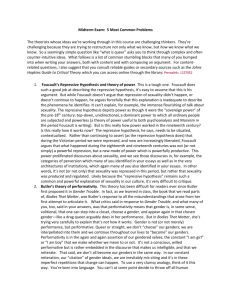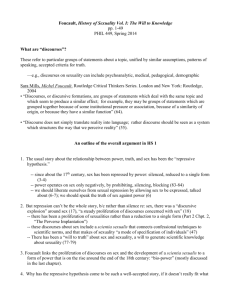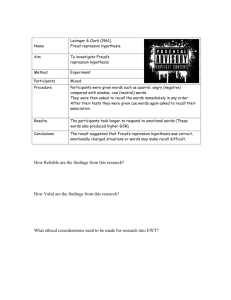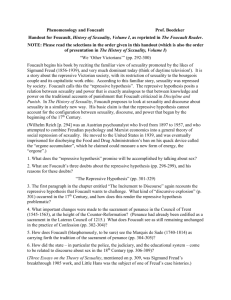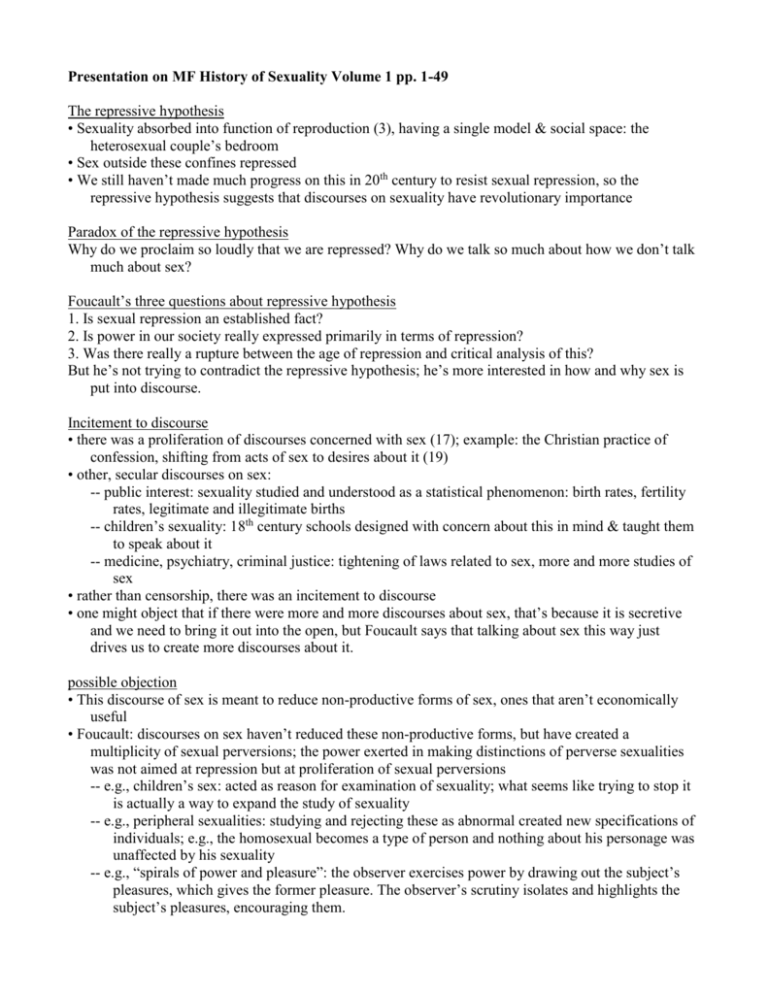
Presentation on MF History of Sexuality Volume 1 pp. 1-49
The repressive hypothesis
• Sexuality absorbed into function of reproduction (3), having a single model & social space: the
heterosexual couple’s bedroom
• Sex outside these confines repressed
• We still haven’t made much progress on this in 20th century to resist sexual repression, so the
repressive hypothesis suggests that discourses on sexuality have revolutionary importance
Paradox of the repressive hypothesis
Why do we proclaim so loudly that we are repressed? Why do we talk so much about how we don’t talk
much about sex?
Foucault’s three questions about repressive hypothesis
1. Is sexual repression an established fact?
2. Is power in our society really expressed primarily in terms of repression?
3. Was there really a rupture between the age of repression and critical analysis of this?
But he’s not trying to contradict the repressive hypothesis; he’s more interested in how and why sex is
put into discourse.
Incitement to discourse
• there was a proliferation of discourses concerned with sex (17); example: the Christian practice of
confession, shifting from acts of sex to desires about it (19)
• other, secular discourses on sex:
-- public interest: sexuality studied and understood as a statistical phenomenon: birth rates, fertility
rates, legitimate and illegitimate births
-- children’s sexuality: 18th century schools designed with concern about this in mind & taught them
to speak about it
-- medicine, psychiatry, criminal justice: tightening of laws related to sex, more and more studies of
sex
• rather than censorship, there was an incitement to discourse
• one might object that if there were more and more discourses about sex, that’s because it is secretive
and we need to bring it out into the open, but Foucault says that talking about sex this way just
drives us to create more discourses about it.
possible objection
• This discourse of sex is meant to reduce non-productive forms of sex, ones that aren’t economically
useful
• Foucault: discourses on sex haven’t reduced these non-productive forms, but have created a
multiplicity of sexual perversions; the power exerted in making distinctions of perverse sexualities
was not aimed at repression but at proliferation of sexual perversions
-- e.g., children’s sex: acted as reason for examination of sexuality; what seems like trying to stop it
is actually a way to expand the study of sexuality
-- e.g., peripheral sexualities: studying and rejecting these as abnormal created new specifications of
individuals; e.g., the homosexual becomes a type of person and nothing about his personage was
unaffected by his sexuality
-- e.g., “spirals of power and pleasure”: the observer exercises power by drawing out the subject’s
pleasures, which gives the former pleasure. The observer’s scrutiny isolates and highlights the
subject’s pleasures, encouraging them.
-- e.g., the broadening of scrutiny of sex generally: this causes sex to saturate society; now, almost
every area of life is now seen through sexuality, such as aspects of family life.
Questions
1. While stating that it’s not a part of his project to contradict or condemn the repressive hypothesis,
does Foucault’s account suggest condemnation of the former?
-- (Presenter) I think he does, b/c the objections he gives to his own account seem to be coming from
someone who is supporting the repressive hypothesis.
-- What he is condemning is not the repressive hypothesis but what comes after it, how we are still
contained by power relations operating on sex
-- There probably isn’t any purely descriptive narrative, because whenever you select particular things to
discuss you are doing so on the basis of particular interests.
-- But this doesn’t necessarily mean there’s anything prescriptive going on, that the author is telling
you what to do.
-- When he says he doesn’t want to contradict the repressive hypothesis his goal is rather to reframe how
we’re talking about it. People use the repressive hypothesis as a starting point about sex and frame
all discourse about sex on that. But he’s saying there’s a wider discourse about sex that we’re not
paying attention to, that we need to be talking about more. The repressive hypothesis is not the
whole story about how sex and power are related.
-- He’s trying to situate the repressive hypothesis in a larger context, a larger discourse around sex.
The repressive hypothesis is part of that discourse.
-- Exactly; that larger discourse about sex that the repressive hypothesis is part of becomes clearer
later in the text; we don’t have everything needed to quite understand it just from the first 50
pages.
-- Maybe he’s asking us to rethink repression; perhaps we can see it as not just a negative thing but also
something that led to creation of other things that are useful?
2. Was Foucault’s characterization of the repressive hypothesis a fair one?
(Presenter) Foucault seems to characterize repression as making things like peripheral sexuality
disappear. But repression is more complex than that: it could have to do with rights of particular
groups, for example, rather than just the idea that they are completely forced to disappear.
-- The more important question is whether we today, now, conceive of ourselves and our sexuality in
this way. We can see this around us today, such as in discourses in magazines like Cosmo where sex
seems spoken of as a source for liberation.
3. Can one imagine any instances of sexual repression in contemporary Western societies or other
societies around the world?
-- What should we say about sexual repression that we might want to call legitimate? E.g., female
genital mutilation can be said to be problematic, so we could be said to be “repressing” the sexuality
of those who want it for women.
-- Sexual repression can be done by one’s own will, such a eunuchs, celibacy
other topics
It seems we can read these first couple of chapters of the book as not just talking about sex, but as how
discourses work re: many taboo subjects. We could slot other issues in for “sex” in this book and the
power relations would work similarly.
What’s going on here: a system of power identifies a problem like homosexuality, then it identifies you
as an individual with that particular sexuality, but if you try to liberate yourself from it all you can
appeal to is the system itself as the basis for your liberation (i.e., all you can do is define yourself the
way you have been defined). So there’s this problematic relationship between power and resistance
here.
-- Yes, that comes up even more clearly later in the book when Foucault points out that speaking as
if we are liberating our sexuality from repressive power by talking about it and acting on it
doesn’t really address the power relations that encourage us to do those very things. The
repressive hypothesis is part of a larger kind of power relation that encourages discourses on sex
through this very idea that we are repressed and need to liberate ourselves from repression by
talking about it.

